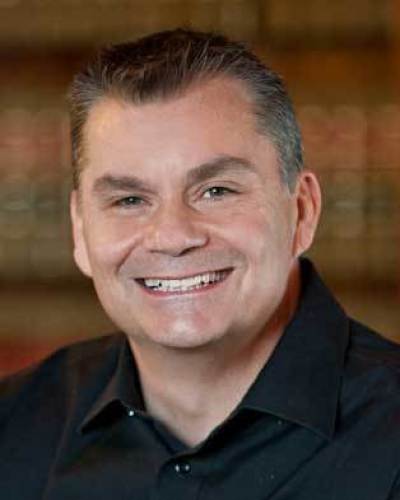The day a demon went to church

The former senior pastor of my church has a group of other pastors in the city that he collaborates with on sermon material. One of them shared with him a very out-of-the-ordinary occurrence at his church.
A man in their congregation had started disrupting services by standing up and loudly speaking in an unknown language. The pastor took the person into his office and started talking with him when the man suddenly stood up and repeated what he was doing during the service.
The pastor asked the man multiple times to stop but he wouldn’t. Exasperated, the pastor finally said, “In Jesus’ name, stop!”
The guy froze like a statue for a second, looked directly at the pastor, swore at him, and then continued with the same vocalizations.
Although rattled, the pastor had the presence of mind to realize what was in front of him, and said, “In Jesus’ name, tell me what you are saying.” The man stopped again, smiled, and repeatedly said, “I love Satan”.
Demons Today?
The idea of demon activity – at least to most people in twenty-first century America – is something they expect to only encounter in Netflix’s and Amazon’s horror movie streaming services. But in other countries, it’s a different story.
In 2019, the Vatican made headlines for its declarations that exorcism requests were so numerous in Italy and elsewhere that they were dramatically increasing the number of trained exorcists worldwide and starting to offer their training to those outside Catholicism. Books like Matt Baglio’s The Rite chronicled the Vatican’s training and illustrated what awaited those who were skeptical about demon activity occurring today.
Of course, the book and movie that brought demons and exorcism front-and-center decades ago was The Exorcist. What most don’t know is that the book’s author – William Peter Blatty – was motivated to write his famous work for Christian apologetics reasons.
Blatty wrote an article in October 2011 to mark the 40th anniversary of The Exorcist where he said, "If an investigation were to prove that possession is real, what a help it would be to the struggling faith of possibly millions, for if there were demons, I reasoned, then why not angels? Why not God?" Blatty also put to rest the idea that his book was based on the exorcism of a young American boy that occurred in the late 1940s. Instead, Blatty said that The Exorcist was produced from his research on exorcisms performed around the globe.
The point Blatty made is an important one. If un-prejudicial, carefully conducted investigations verify demonic activity and/or possessions, then the conclusions are devastating for the atheistic and naturalistic philosophy positions that assert there is nothing beyond this physical life. Further, the validation that these spiritual entities behave in a manner described in the Bible and obey the authority of Christ lends great support for the truth claims of Christianity.
Demons in the Pews?
The idea of a demon sitting in the pew beside you may seem like a far-fetched idea, but the first chapter of Mark describes just such a thing: “They went into Capernaum; and immediately on the Sabbath He entered the synagogue and began to teach. They were amazed at His teaching; for He was teaching them as one having authority, and not as the scribes. Just then there was a man in their synagogue with an unclean spirit; and he cried out, saying, “What business do we have with each other, Jesus of Nazareth? Have You come to destroy us? I know who You are — the Holy One of God!” And Jesus rebuked him, saying, “Be quiet, and come out of him!” Throwing him into convulsions, the unclean spirit cried out with a loud voice and came out of him” (Mark 1:21-26).
You have to wonder – did the people in the synagogue around the demon-possessed guy have any idea about his possession? Did the man greet people, make normal chit-chat, etc., before the spirit inside him was provoked by Christ?
Respected Bible teachers who have encountered demonic activity report that there is no one-size-fits-all profile for people who are suffering from demonic affliction. Those who have written on the subject include author and pastor Chip Ingram who describes his encounters with demons in his book The Invisible War, Dallas Seminary professor and theologian Merrill Unger who has written widely on the subject concerning his personal interactions with the demonic, and well known pastor Chuck Swindoll who wrote in his small book entitled Demonism: "On a few occasions I have assisted in the painful process of relieving them [people who come to him for spiritual help] of demons."[1]
While people who are demonically afflicted are not common, neither are they single-digit in nature. Blatty says in his article: "What my research made clear; namely, that in every period of recorded history, and in every culture and part of the world, there have been consistent accounts of possession and its symptoms going all the way back to ancient Egyptian chronicles, and where there is that much smoke, my reason told me, there is probably fire – and a lot of it, if you get my meaning."
I get his meaning. Of course, we acknowledge that there is a lot of mental illness in the world and that personality disorders exist. Such individuals do not have any spiritual issue but are rather suffering from emotional or chemical problems that can be rectified with the right therapy and medication.
But like Blatty says, when those causes are ruled out, the remaining fire points in the direction of the Bible and the God proclaimed within it. An unlikely apologetic? Yes. But a pretty good one, though, in my opinion.
[1] Charles Swindoll, Demonism (Portland, OR: Multnomah, 1981), pp. 18-19.
Robin Schumacher is a software executive and Christian apologist who has written many apologetic articles, appeared on nationally syndicated radio programs, and presented at various apologetic events. He holds a Master's in Christian apologetics and a Ph.D. in New Testament.




























